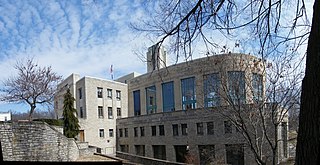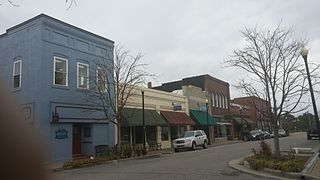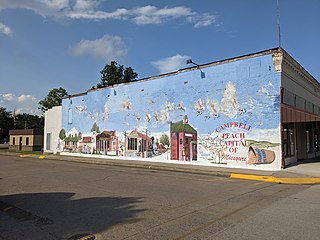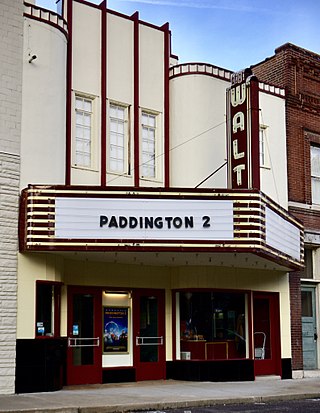
Excelsior Springs is a city in Clay and Ray counties in the U.S. state of Missouri and part of the Kansas City metropolitan area. The population was 10,553 at the 2020 census. It is located approximately 30 miles (48 km) northeast of central Kansas City, Missouri.

The Main Street Historic District in Miles City, Montana comprises much of the central business district of the town, extending along Main Street roughly between Prairie Avenue and Fourth Street. It was listed as a historic district on the National Register of Historic Places in 1989.

Frank L. Packard was a prominent architect in Ohio. Many of his works were under the firm Yost & Packard, a company co-owned by Joseph W. Yost.

The Bristol Commercial Historic District is a national historic district in Bristol, Tennessee and Bristol, Virginia.

Welch Commercial Historic District is a national historic district located at Welch, McDowell County, West Virginia. The district includes 56 contributing buildings and one contributing structure in Welch's central business district. It includes a variety of retail stores, banks and offices, with some having apartment rental on their top floors. Also on the district is a municipal parking garage built in 1941. Notable buildings include The Liberty Building, the Flat Iron Building, Bablis Building, former City Hall, Odd Fellows Temple (1929), Carter Hotel-Tyson Tower Building (1924), Wyoming-Elkhorn Apartment Building, McDowell County National Bank (1900), and McDowell County Courthouse Annex Building (1935).

Edmond J. Eckel was an architect in practice in St. Joseph, Missouri, from 1872 until his death in 1934. In 1880 he was the founder of Eckel & Mann, later Eckel & Aldrich and Brunner & Brunner, which was the oldest architectural firm in Missouri prior to its eventual dissolution in 1999.

Front Royal Historic District is a national historic district located at Front Royal, Warren County, Virginia. The district encompasses approximately 470 contributing buildings and structures in the town of Front Royal. It has a mix of commercial, residential, industrial, religious and governmental buildings dating from the late-18th to mid-20th centuries. Notable buildings include the former Proctor-Biggs Mill, a former apple warehouse, Murphy's Theater (1908-1909), Compton's Corner, first Bank of Warren, Trout Drugstore Building, second Bank of Warren building (1914), Montview Hotel, Park Theater, the Henry Trout House, Mullen-Trout House, Giles-Cooke House, and the Dr. Manly Littleton Garrison. Located in the district and separately listed are the Balthis House and Warren County Courthouse.

Downtown Gastonia Historic District is a national historic district located at Gastonia, Gaston County, North Carolina. It encompasses 77 contributing buildings and 1 contributing object in the central business district of Gastonia. The commercial, civic, institutional, and multi-unit residential buildings were built between the 1890s and 1954, and include notable examples of Colonial Revival and Classical Revival architecture. Located in the district are the separately listed former Gaston County Courthouse, First National Bank Building, Third National Bank Building, and Robinson-Gardner Building. Other notable buildings include the U.S. Post Office (1935), York Medical Building (1938), Kress Department Store, Leibowitz Department Store, Ideal Moving Picture Theater, City Hall, Kirby Building (1922), First Baptist Church (1922), Gaston County War Memorial Hall (1928), and the (former) Gaston County Public Library (1930).

Columbia Historic District is a national historic district located at Columbia, Tyrrell County, North Carolina. It encompasses 119 contributing buildings, 1 contributing structure, and 1 contributing object in the central business district and surrounding residential sections of Columbia. The district developed between about 1880 and 1944 and includes examples of a variety of popular architecture styles. Located in the district is the separately listed Tyrrell County Courthouse. Other notable buildings include Snell's Inn, Columbia Garage, Columbia Christian Church, McClees-Coffield House, Combs-Hussey House, Frederick L. W. Cohoon House, Columbia Baptist Church (1905), W. J. White Building (1931-1932), Columbian Theatre, Wesley United Methodist Church (1912), St. Andrews Episcopal Church (1909), Tyrrell County Jail, Merchants and Farmers Bank / East Carolina Bank, Tyrrell County Bank, and Columbia Theatre.

Lowell Commercial Historic District is a national historic district located at Lowell, Lake County, Indiana. The district encompasses 28 contributing buildings, 1 contributing site, and 1 contributing object in the central business district of Lowell. It developed between about 1870 and 1952, and includes notable example of Italianate, Queen Anne, Romanesque Revival, Bungalow / American Craftsman, and Art Deco style architecture. Notable buildings include the Roberts Building (1948), Colfax Lodge (1898), Bacon House, Lowell National Bank (1903), Lowell Town Hall (1922), and Lowell Carnegie Library (1920).

Franklin Street Commercial Historic District is a national historic district located at Michigan City, LaPorte County, Indiana. The district encompasses 73 contributing buildings and 1 contributing object in the central business district and surrounding residential section of Michigan City. It developed between about 1875 and 1955, and includes examples of Italianate, Gothic Revival, Queen Anne, Classical Revival, and Tudor Revival style architecture. Located in the district is the separately listed Michigan City Post Office (1909-1910). Other notable buildings include the Staiger House, Earl House, M & M Diner (1955), Zorn Building (1907), St. Paul's Lutheran Church (1876) and rectory (1888), First Federal Savings Bank, Aicher Block (1914), Brinkman Building, Trinity Episcopal Church (1889), Merchants National Bank Building (1926), Ledbetter Building (1908), Rodenbeck Saloon, First Methodist Episcopal Church (1922), Barker Hall (1929), Masonic Temple (1922-1923), and the Salvation Army Building (1925).
Downtown Monett Historic District is a national historic district located at Monett, Barry County, Missouri. It encompasses 35 contributing buildings in the central business district of Monett. The district developed between about 1892 and 1947, and includes representative examples of Classical Revival and Streamline Moderne architecture. Notable buildings include the Ozark Fruit Growers Association (1926), Armstrong and Sons Grocers (1914), Wilson Opera House (1893), Zumwalt Lunch Stand (1928), Callaway Furniture Store (1916), Hoberg Building (1893), First National Bank, Main Variety (1945), Bill Martin's Chevrolet, Monett State Bank, City Hall and Fire Station, Gas Service Company and Battery Factory (1917), Post Office (1936), and Masonic Temple (1922).

Jackson Uptown Commercial Historic District is a national historic district located at Jackson, Cape Girardeau County, Missouri. The district encompasses 23 contributing buildings in the central business district of Jackson. It developed between about 1880 and 1953, and includes representative examples of Classical Revival style architecture. Notable buildings include the Cape Girardeau County Savings Bank, Kertsners's Drug Store, Cape Girardeau County Courthouse designed by P.H. Weathers, and Jones Drug Store.

Harrisonville Courthouse Square Historic District is a national historic district located at Harrisonville, Cass County, Missouri. The district includes 34 contributing buildings, 1 contributing structure, and 1 contributing object in the central business district of Harrisonville. It developed between about 1880 and 1943, and includes representative examples of Italianate, Queen Anne, Colonial Revival, Tudor Revival, and Renaissance Revival style architecture. Notable buildings include the Cass County Courthouse (1897), New Method Laundry (1929), Cass County Democrat, Wooldridge Building, Bank of Harrisonville (1900-1901), Wirt's Opera House Building, Post Office Building (1925), Emmons Building/Bowman Building (1887), Evans Building (1890), White Motor Company, Stephen Stuart "Racket" Store, First National Bank of Harrisonville, and Deacon Building (1892).

Hall of Waters, also known as Siloam Park and Springs, is a historic building located at Excelsior Springs, Clay County, Missouri. It is currently the City Hall of Exceisor Springs. It is the site of the first spring of many discovered in Excelsior Springs in the 1880s and 1890s. It was built as a mineral water health resort, with mineral baths and water bottling plant, capturing water from the springs.

Excelsior Springs Hall of Waters Commercial West Historic District is a national historic district located at Excelsior Springs, Clay County, Missouri. It encompasses 20 contributing buildings in the central business district of Excelsior Springs. The district developed between about 1894 and 1948, and includes representative examples of Victorian, Classical Revival, and Art Deco style architecture. Notable buildings include the Excelsior Springs Post Office (1914), McCleary Thornton-Minor Hospital, Montgomery Ward Building (1929), J.J. Newberry Company Building, J.C. Penney Company Building, Elks Lodge No. 1001, Washington Hotel and Orpheus Theatre, I.O.O.F. Building (1913-1917), Arlington Hotel (1899-1900), and Ideal Hotel.

The Elms Historic District is a national historic district located at Excelsior Springs, Clay County, Missouri, United States. It encompasses 31 contributing buildings, 1 contributing site, and 7 contributing structures in a predominantly residential section of Excelsior Springs. The district developed between about 1887 and 1963, and includes representative examples of Gothic Revival, Tudor Revival, and Bungalow style architecture. It is anchored by the separately listed Elms Hotel and consists of two historic residential plats: the Central Park and the Elms Addition.

Campbell Commercial Historic District is a national historic district located at Campbell, Dunklin County, Missouri. The district encompasses 19 contributing buildings in the central business district of Campbell. The district developed between about 1883 and 1930, and includes representative examples of Colonial Revival style architecture. Notable buildings include the Rice Hardware Company, Cotton Belt Hotel, City Hall (1906), Boyd's Department Store, and Pol-Mac Hotel.

New Haven Commercial Historic District is a national historic district located at New Haven, Franklin County, Missouri. The district encompasses nine contributing buildings in the central business district of New Haven. The district developed between about 1890 and 1940, and includes representative examples of Italianate and Art Deco style architecture. Notable buildings include the John P. Altheide Store, Oscar Hoemeyer Hardware Store (1895), New Haven post Office / Farmer's Savings Bank, Frederick W. Pehle Building / Krull's Department Store (1905), Otto Bucholtz Store, and Walt Theater (1940).
La Plata Square Historic District is a national historic district located at La Plata, Macon County, Missouri. The district encompasses 36 contributing buildings, 1 contributing site, and 1 contributing structure in the central business district and surrounding residential area of La Plata. It developed between about 1855 and 1958, and includes representative examples of commercial architecture. Notable contributing resources include the La Plata Public Square (1855), Home Press Building, Farmer's and Merchants Bank, Myron Sears Variety, Masonic Hall/La Plata State Bank, Tonkinson and Harris Ford Dealership, The Famous (1908), Wheatcraft Motor Company (1924), La Plata Fire Department, and Post Office (1937).





















